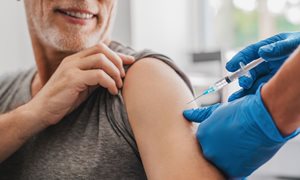
A new COVID-19 vaccine based on a different platform than current vaccines on the market has been tested in humans for the first time by researchers at Radboud university medical center. Administration of this vaccine in healthy study participants was well tolerated and led to a good immune response. The effectiveness of the vaccine is currently being further investigated. First results are expected later this year.
The new vaccine, called ABNCoV2, is different from coronavirus vaccines marketed to date: the mRNA vaccines (such as those from Pfizer and Moderna), the vector vaccines (such as those from Janssen and AstraZeneca) and the protein vaccine made by Novavax. ABNCoV2 is a capsid-like virus-like particle (VLP) vaccine. This means that the new corona vaccine consists of elements that resemble virus particles. To the immune system, these particles look like a virus, but they cannot replicate. The virus-like particles can be charged with antigens such as the spike protein of the coronavirus SARS-CoV-2. As a result, the body quickly reacts to the virus by making antibodies and T cells.
This vaccine was developed by the Danish biotechnology company AdaptVac, in collaboration with Radboudumc and the Prevent-nCoV consortium. Radboudumc was responsible for the design and implementation of the study.
Few side effects
This study, conducted by a team of clinical researchers at Radboud university medical center, investigated safety and tolerability of the vaccine. 45 healthy study participants, who had not yet had COVID-19 and had not been vaccinated, received two doses of the new vaccine. They were followed for six months after the second vaccination. The participants produced antibodies and T cells against SARS-CoV-2. Moreover, the study showed that the vaccine was well tolerated by the study participants: a few side effects were reported. Principal investigator Prof. dr. Benjamin Mordmüller, professor of medical microbiology at Radboud university medical center: "The vaccine has exceeded our expectations in terms of immunity and tolerability”. The results have now been published in The Lancet Microbe.
Effectiveness
To determine the effectiveness of this vaccine, follow-up research is needed. Several efficacy studies are currently taking place. Clinical investigator Merel Smit is hopeful about this: a vaccine based on a similar principle is the vaccine against the HPV virus that can cause cervical cancer, among other things. With this vaccine, immunity is maintained for a long period of time and no booster later in life is needed. If this also applies to the new corona vaccine, it may mean that any booster vaccinations can be given at longer intervals.
Other infectious diseases
An important advantage of this type of vaccine is its ability to be quickly adapted in the event that the SARS-CoV-2 virus acquires mutations that reduce the efficacy of the ABNCoV2 vaccine. In addition, this so-called cVLP platform, the basis of the vaccine, is highly flexible and can also be used to develop improved vaccines for global infectious diseases, such as malaria and influenza. This was not yet possible with the vaccine against the HPV virus. A malaria vaccine is currently being developed based on this vaccine, which is expected to be tested next year.
Mordmüller: "The results are very good news for the development of vaccines against a wide range of infectious diseases for which we have no or only partially active conventional vaccines” says Mordmüller.
About the publication
This study was published in The Lancet Microbe: First-in-human use of a modular capsid virus-like vaccine platform: an open-label, non-randomized, phase 1 clinical trial of the SARS-CoV-2 vaccine ABNCoV2 . Merel J Smit, Adam F Sander, Maud B P A Ariaans, Cyrielle Fougeroux, Constanze Heinzel, Rolf Fendel, Meral Esen, Peter G Kremsner, Rob ter Heine, Heiman F Wertheim, [...] Willem A de Jongh, Matthew B B McCall, Morten A Nielsen, Benjamin G Mordmüller, on behalf of the COUGH-1 trial study group.
-
Want to know more about these subjects? Click on the buttons below for more news.
More information
Pauline Dekhuijzen

wetenschaps- en persvoorlichter
Related news items






